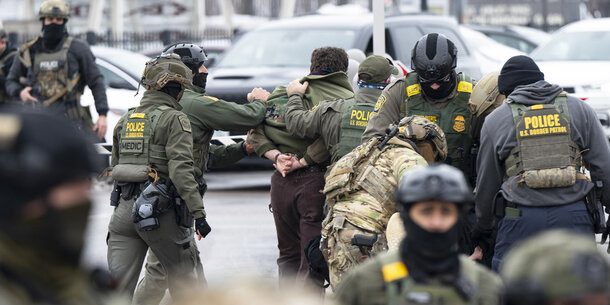On January 13, Donald Trump was impeached for a second time by the House for his involvement in inciting an insurrection on the Capitol — an attack motivated by a broader attempt to overturn the results of a free and fair election. The articles of impeachment have since been delivered to the Senate, where Trump’s second impeachment trial awaits.
The insurrection was not only an attack on the Capitol — it was an attack on American democracy. It punctuated a period that has been marked by constant violations of democratic and constitutional norms. And it has underscored the need to not only hold elected officials accountable, but also reckon with long-term threats to the nation’s democratic institutions and restore the guardrails that have eroded in recent years. Congress can enact legislation such as the Protecting Our Democracy Act that would mark concrete progress toward strengthening government accountability and preventing the abuse of power, including the president’s emergency powers.
How did the insurrection at the Capitol build on the constant violations of democratic and constitutional norms over the last few years?
Elizabeth Goitein: Our national security and emergency laws give the president tremendous discretion and create room for abuse. In practice, they allow the president to declare an emergency where none exists, in order to further his own personal or political ends — with then–President Trump’s border wall emergency being the most obvious example. But interestingly, what we saw from Trump over the past year was an entirely different kind of abuse of emergency powers, which was the politically motivated failure to use emergency powers, when available, during a real emergency. We saw this with the Covid-19 crisis: the failure to fully use the powers available to the federal government based on the political advantage that he thought he could gain by downplaying the virus and by leaving it all to the states to handle.
The storming of the Capitol was another example of this kind of abuse through inaction. It was clearly an emergency. It may have been an appropriate occasion for Trump to invoke the Insurrection Act. And it was certainly a moment to deploy federal law enforcement agents and potentially National Guard forces in strength. That didn’t happen. And it’s difficult to say how much of that can be traced to the former president, since the facts are still unfolding. But it’s hard to deny that if he had wanted to, he could have made things move a lot faster and could have made sure there was better preparation for what happened.
And he obviously didn’t want to. He was not only happy to have the insurrection happen, he encouraged it to happen in the first place, which is an even bigger problem. But when it came to the abuse of emergency powers, something that distinguished Trump was his willingness to place partisan politics, and more specifically his own self-interest, over the national security. We saw it when he withheld aid to Ukraine to pressure the Ukrainian president to investigate his political rival, Joe Biden. And we saw it at the Capitol riot.
Martha Kinsella: The Trump administration had a pattern of distorting facts for political gain, such as by perpetuating the pernicious myth of voter fraud and by fomenting Covid-19 denialism in its pandemic response. That all came to a head with the incitement of people to force their way into the Capitol, without masks, to try to stop the peaceful transition of power.
How should the country begin the conversation about accountability for what happened at the Capitol?
Daniel I. Weiner: Most people would agree that there has to be some individual accountability for trying to overthrow our government. That’s obviously the focus of the criminal proceedings we are going to see against some of the people involved in storming the Capitol. It is also the impetus for impeachment. Public officials have to be accountable for their public acts. Both impeachment and other types of political sanctions don’t require actual illegality. Even if it is impossible or impractical to prosecute Trump in this context, there has still been a grave offense against our democratic order, which must be addressed.
Goitein: What distinguishes a liberal democracy from an autocracy is the rule of law — and the rule of law depends on accountability. If you don’t have accountability, then the law is just words on a piece of paper. When it comes to the attack on the Capitol — inciting insurrection — that’s not about norms or how presidents usually behave. That was a direct assault on the rule of law and on our democracy. That’s why you hear so many organizations saying that this is a red line, that it doesn’t matter what the political fallout will be of trying to impeach, of trying to invoke the 25th Amendment or the 14th Amendment, or whatever the accountability mechanism may be. They’re saying that whatever the consequences, it has to be done, because this was extreme abuse and crossed a red line — and if there is no accountability or no effort at accountability, we can all just give up and go home.
How would the Protecting Our Democracy Act ensure accountability for and prevent future misconduct?
Kinsella: The insurrection was the culmination of a long series of lawless acts by the Trump administration that the Protecting Our Democracy Act begins to address. The bill would codify a norm that has existed since the Ford administration of limiting contacts between the White House and the Department of Justice, addressing the problem of politics infecting law enforcement decisions — something that we saw happen over and over again during the Trump administration. Additionally, there needs to be accountability within the executive branch, something that inspectors general help ensure. During the Trump administration, there were a couple of high-profile stories about the removal of inspectors general. A provision of the Protecting Our Democracy Act would ensure that inspectors general are insulated from political pressure. That part of the bill passed the House already in the first few days of the new Congress.
The Protecting Our Democracy Act also deals with presidential pardon power. It would both deter self-pardons — which was reported as something that Trump was contemplating in his final days in office — and add some transparency to the pardon power, with disclosure requirements for a subclass of pardons involving relatives of the president. These measures would be a good start. The Brennan Center’s bipartisan National Task Force on Rule of Law & Democracy has proposed a related reform that would require disclosure of information about pardons of close associates.
Weiner: Another very important component of the act is codification of the Foreign and Domestic Emoluments clauses — constitutional provisions that restrict the president from taking benefits from foreign governments and U.S. states. (The Foreign Emoluments clause applies to all federal officials, while the Domestic Emoluments clause is limited to the president.) When Trump became president, he refused to divest from his businesses (breaking with a 60-year tradition). During his presidency, patronizing a Trump hotel or club became a favored way for both foreign allies and domestic supporters to curry favor with the president in ways that likely violated these provisions. Multiple lawsuits were filed, but it is ultimately very hard to enforce this sort of constitutional safeguard unless Congress enacts a basic statutory framework to implement it, which is what the Protecting Our Democracy Act would do.
How would the Protecting Our Democracy Act address the presidential abuse of emergency powers?
Goitein: Trump abused emergency powers in a number of ways — and unfortunately, the law made it very easy for him to do that. Under the National Emergencies Act, he was able to declare a national emergency predicated on unlawful immigration at the southern border, despite the fact that there was actually no such emergency. And he was able to secure funds to build the border wall, even after Congress had denied him those funds. Even though some courts have held that this was unlawful, he managed in the meantime to build hundreds of miles of border wall. He also declared a national emergency in order to sanction personnel at the International Criminal Court for having the temerity to investigate alleged war crimes by U.S. personnel. And he abused emergency powers in a number of other ways as well.
There is a bill called the Article One Act that has had bipartisan support that would restore Congress as a meaningful check against presidential abuse of emergency powers by requiring congressional approval of emergency declarations within 30 days. A version of that bill was incorporated into the Protecting Our Democracy Act. Passing that legislation is no less important now that Trump has left office, because he was not the first president to abuse emergency powers and he will not be the last to try. So, it’s imperative to get this reform passed while we can, and not when we’re already in the midst of the next emergency or abuse of emergency powers.
The Reign Act, which is included in the Protecting Our Democracy Act, is another provision that addresses emergency powers by requiring disclosure of presidential emergency actions documents to Congress. These are draft presidential orders that are prepared in anticipation of a broad range of worst-case emergency scenarios. And we don’t know what’s in them because they’ve never been released or leaked. But there are some official descriptions of older presidential emergency actions documents, dating from the 1950s to the 1970s. And from those descriptions we know that they purported to authorize things like martial law, suspension of habeas corpus by the president, censorship of the press, warrantless searches, roundup and detention of people considered dangerous, and other things that are clear violations of the Constitution.
It’s imperative to know what’s in the current version of these documents, lest they also purport to authorize actions that go against the Constitution. And yet, there’s no congressional oversight and no congressional access to these documents. The Protecting our Democracy Act includes a provision that would require disclosure to the relevant committees of Congress.
How have recent events altered the United States’ standing as a country that upholds the rule of law and democratic norms?
Goitein: Our democracy is both remarkably strong and remarkable fragile, in the sense that we’ve been able to withstand a president’s effort to essentially end our democracy and to overturn an election. On the other hand, I think a lot of us thought that such an assault was not possible in the United States in the first instance. Now we know that it is possible, and that it was far too close for comfort. So, now is absolutely a time for a reckoning. Our democracy is not immune from threats. We need to shore up the protections we have to keep our democracy strong.
Weiner: President Biden is very focused on America’s standing as a leading democracy. His administration has made it a priority to restore that standing. It’s critical to shore up our institutions at home, to shore up guardrails. And if we want to claim the leadership role that the president is very committed to, we need to take seriously the threats to our own democratic institutions. And I firmly believe the way to do that is to look at some of the unwritten rules that we thought would hold and have gradually eroded, and to try to restore them with legislation.
Goitein: We also need to take a look at some of the written rules that proved not to be the safeguards we thought they were, and revisit those as well.






